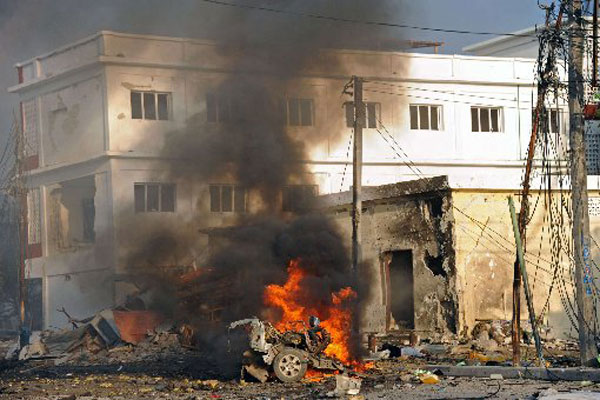Remembering hotel owner who made the world focus on Somalia

By Tom Osanjo
On a reporting assignment in Mogadishu many years ago, I got wanderlust and decided to follow up a story on how a group of Kenyan and Reuters journalists were killed.
The killing of these journalists, way back in 1993 was big news. It even formed the storyline of the movie “Blackhawk Down”.
One of the journalists, Hos Maina, was a man I admired though we never met.
I came to like Mr Maina because of an incident during one of the national days at Nyayo National Stadium, Nairobi.
President Daniel arap Moi was under immense pressure from opposition activists and western governments to allow multi-party politics.
On this day, the President walked to a group of journalists covering the function. He challenged them: “Where in Africa has multi-partysm ever succeeded?”
“Zambia,” Mr Maina replied, to the chagrin of the head of state.
About a decade later in Mogadishu one morning, I asked my minders to take me where the journalists were killed.
It turned out to be a very bad idea.
Taking a drift near former warlord Mohammed Farah Aideed’s residence, we ran into an ambush.
An argument ensued between my bodyguards and the thugs who had laid the ambush.
Trembling, I asked my chief bodyguard, Abdi, what the problem was.
“They want to kill you!” he quietly replied. The reason for my death sentence was that we never asked for permission before using the route.
NATURAL CALMNESS
Alternatively, we could be released if we paid ransom.
All this intense life and death discussion was taking place in Somali language so I could not follow anything.
I only heard the would-be executioners talk of BBC as they pointed in my direction.
The only news outlet the gunmen were familiar with was the BBC and so all journalists were working for the British broadcaster!
At one point, I told Abdi to risk it and order the driver to speed off but he rejected the idea.
He pointed to the top of the charred buildings. I saw about 30 to 50 snipers with guns trained on us.
Obviously, my 10 bodyguards would be no match for this army. I resigned to fate.
It is interesting what goes through a man’s mind when he is staring at death.
Apart from repenting, my only thought was if anybody would find my body and take it for burial next to my mother’s grave in Nyakach, Kisumu County.
As I sweated, my photographer colleague Khamis Ramadhan was the opposite.
With the natural calmness of the Swahili people, Rama was busy clicking away the unfolding scenario.
“Utafanya hawa watu watudedise (You will make these people kill us),” I hoarsely whispered but Rama went on undeterred clicking as if he was not part of the drama.
13 KILLED
Finally, and after what appeared like a century, Abdi had the presence of mind to call his boss, the owner of Sahafi Hotel, Abdirashid Ilgayte, who was our host.
This was no nonsense man and even Mogadishu warlords feared him.
After a terse exchange by phone, we were let free.
Later, we spent the better part of the evening thanking Mr Ilgayte for saving our lives.
Last Sunday Al-Shabab gunmen stormed the hotel and bombed it, killing 13 people, among them Mr Ilgayte.
Through his contacts, I got to get gems of stories in Mogadishu.
I interviewed a new breed of entrepreneurs who were leaving their comfortable lives in western capitals to come and rebuild their war-torn country.
It is also here that I got a world scoop by interviewing a group of Tanzanians fleeing post-election violence in Pemba.
They were refugees living on food and other donations from Mogadishu’s poor.
Daily Nation